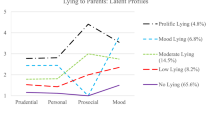Abstract
Communication between children and parents has been the subject of several studies, examining the effects of, for example, disclosure and secrecy on adolescents’ social relationships and adjustment. Less attention has paid to adolescent deception. We developed and tested a new instrument on lying behavior in a sample of 671 parent-adolescent couples. Analyses on the psychometric properties showed that this instrument had one principal component, and high internal consistency, item-total correlations and inter-item correlations. Lying was moderately associated with other indicators of parent-child communication, the quality of the parent-child relationship, and with parenting practices. In addition, frequent lying was moderately related to behavioral problems and emotional problems.
Similar content being viewed by others
References
Achenbach TM (1991) Manual for the Youth Self-Report and 1991 profile. University of Vermont, Department of Psychiatry, Burlington
Allen JP, Hauser ST, Bell KL, O’Connor TG (1994) Longitudinal assessment of autonomy and relatedness in adolescent-family interactions as predictors of adolescent ego development and self-esteem. Child Dev 65:179–194
Armsden GC, Greenberg MT (1987) The Inventory of Parent and Peer Attachment: Individual differences and their relationship to psychological well-being in adolescence. J Youth Adolesc 16:427–454
Backbier E, Hoogstraten J, Meerum Terwogt-Kouwenhoven K (1997) Situational determinants of the acceptability of telling lies. J Appl Soc Psychol 27:1048–1062
Botvin GJ, Botvin EM (1992) Adolescent tobacco, alcohol, and drug abuse: Prevention strategies, empirical findings, and assessment issues. J Dev Behav Pediatr 13:290–301
Brown BB, Mounts NS, Lamborn SD, Steinberg L (1993) Parenting practices and peer group affiliation in adolescence. Child Dev 64:467–482
Cohen S, Kamarck T, Mermelstein R (1983) A global measure of perceived stress. J Health Soc Behav 24:385–396
DePaulo BM, Kashy DA, Kirkendol SE, Wyer MM, Epstein JA (1996) Lying in everyday life. J Pers Soc Psychol 70:979–995
Feldman RS, Tomasian JC, Coats EJ (1999) Nonverbal deception abilities and adolescents’ social competence: Adolescents with higher social skills are better liars. J Nonverbal Behav 23:237–249
Finkenauer C, Engels RCME, Baumeister RW (2005) Parenting and adolescent externalizing and internalizing problems: The role of self-control. Int J Behav Dev 29:58–69
Finkenauer C, Engels RCME, Meeus W (2002) Keeping secrets from parents: Advantages and disadvantages of secrecy in adolescence. J Youth Adolesc 31:123–136
Gervais J, Tremblay RE, Desmarais-Gervais L, Vitaro F (2000) Children’s persistent lying, gender differences, and disruptive behaviours: A longitudinal perspective. Int J Behav Dev 24:213–221
Halpert E (2000) On lying and the lie of a toddler. Psychoanal Q 69:659–675
Houtzager B, Baerveldt C (1999) Just like normal: A social network study of the relation between petty crime and the intimacy of adolescent friendships. Soc Behav Pers 27:177–192
Kashy DA, DePaulo BM (1996) Who lies? J Pers Soc Psychol 70:1037–1051
Kerr M, Stattin H (2000) What parents know, how they know it, and several forms of adolescent adjustment. Dev Psychol 36:366–380
Larson DG, Chastain RL (1990) Self-concealment: Conceptualization, measurement, and health implications. J Soc Clin Psychol 9:439–455
Lee K, Ross HJ (1997) The concept of lying in adolescents and young adults: Testing Sweetser’s folkloristic model. Merrill-Palmer Q 43:255–270
Miller LC, Berg JH, Archer RL (1983) Openers: Individuals who elicit intimate self-disclosure. J Pers Soc Psychol 44:1234–1244
Rosenberg M (1965) Society and the Adolescent Self-image. Princeton University Press, Princeton, NJ
Russell D, Peplau LA, Cutrona CE (1980) The revised UCLA Loneliness Scale: Concurrent and discriminant validity evidence. J Pers Soc Psychol 39:472–480
Stattin H, Kerr M (2000) Parental monitoring: A reinterpretation. Child Dev 1:1072–1085
Stouthamer-Loeber M (1986) Lying as a problem behavior in children: A review. Clin Psychol Rev 6:267–289
Tagney JP, Baumeister RF (2000) High self-control predicts good adjustment, less pathology, better grades, and interpersonal success. Manuscript submitted for publication. George Mason University
Verhulst FC, van der Ende J, Koot HM (1996) Handleiding voor de Youth Self-Report (YSR). Rotterdam: Erasmus Universiteit/Sophia Kinderziekenhuis, Afdeling Kinder-en Jeugdpsychiatrie
Acknowledgements
Rutger Engels was supported by a fellowship of the Dutch Organization of Scientific Research during the preparation of this manuscript. We would like to acknowledge a grant of the Department of Child and Adolescent Studies, Utrecht University, for conducting the study.
Author information
Authors and Affiliations
Corresponding author
Additional information
full professor at the Radboud University Nijmegen. He received his Ph.D. in 1998 from the University of Maastricht. His major research interest is the study of social influence processes, personality characteristics and development of smoking, drinking and drug use in adolescents and young adults.
Associate Professor at the Free University of Amsterdam. She received her Ph.D. in 1998 from the University of Louvain, at Louvain-la-Neuve. Her major research interests are interpersonal relationships, social prediction, secrecy and disclosure, and affective forecasting for self and others.
working as a developmental psychologist. She received her MA in 2001 from the University of Leiden.
Rights and permissions
About this article
Cite this article
Engels, R.C.M.E., Finkenauer, C. & van Kooten, D.C. Lying Behavior, Family Functioning and Adjustment in Early Adolescence. J Youth Adolescence 35, 949–958 (2006). https://doi.org/10.1007/s10964-006-9082-1
Received:
Accepted:
Published:
Issue Date:
DOI: https://doi.org/10.1007/s10964-006-9082-1




